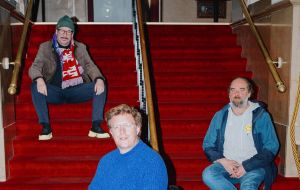'Bowhouse Ghent': six art houses launch pilot project in search of smart collaborations
16 Dec 22
The six Ghent art houses NTGent, CAMPO, Kopergietery, LOD, laGeste and Ontroerend Goed started a pilot project under the banner Bowhouse Ghent. In the coming years, these houses will look for smart ways to cooperate in terms of management and business support, fundraising and international sales. By organising themselves differently, the six art houses try to respond to changing circumstances (changed international market, subsidy budgets, inflation, wage costs, energy crisis, workload, etc.), and aim for better solutions for business support, funding, international distribution and HR.
The six organisations founding Bowhouse Gent together did not find each other by chance: they are all houses that produce performing arts and operate internationally, which means they face the same artistic and business risks. Sufficient trust grew out of the well-established network of the Ghent Kunstenoverleg ('Ghent art dialogue') in recent years to relinquish part of its autonomy and enter into this collaboration, which is unique for the sector, a collaboration that should lead to the realisation of our international ambitions, the optimisation of income, better cost management, a better distribution of the planning burden and improved care for staff and organisation.
The organisations will take time during the next policy period (2023-2027) to work out their new cooperation model. During that time, they will engage with all agencies that inspire, challenge or question them. They look for solutions beyond the regular sharing of know-how and resources. To do so, they give up some of their organisational autonomy, yet the business and artistic identity of each organisation remains guaranteed. The individuality and authenticity of each organisation is and remains a starting point. More and smarter cooperation is sought in these areas:
1. International spreading with aligning spreading strategies, shared promotion and selling at festivals and sector moments, and exchanging and sharing international relationships and representation. Strengthening the underpinnings of the international network.
2. The business support functions such as HR, accounting, financial planning and control, and ICT.
3. The business strategic files related to funding such as European grants, support from international cultural funds, Tax Shelter, alternative funding.
4. Personnel: ensuring that the various technical and production teams reinforce each other. Establish a pool of staff who can step in from other houses in cases of force majeure in the context of international production.
The organisations stress that - although they form a specific core within the Ghent cultural ecosystem - they do not rule out any collaboration with other organisations. They see 'Bowhouse Ghent' as a pilot project that, after a test period and concrete realisation, can serve as an example for other cores within the Ghent cultural ecosystem and for inter-city cooperation.
Read the article in De Morgen HERE
